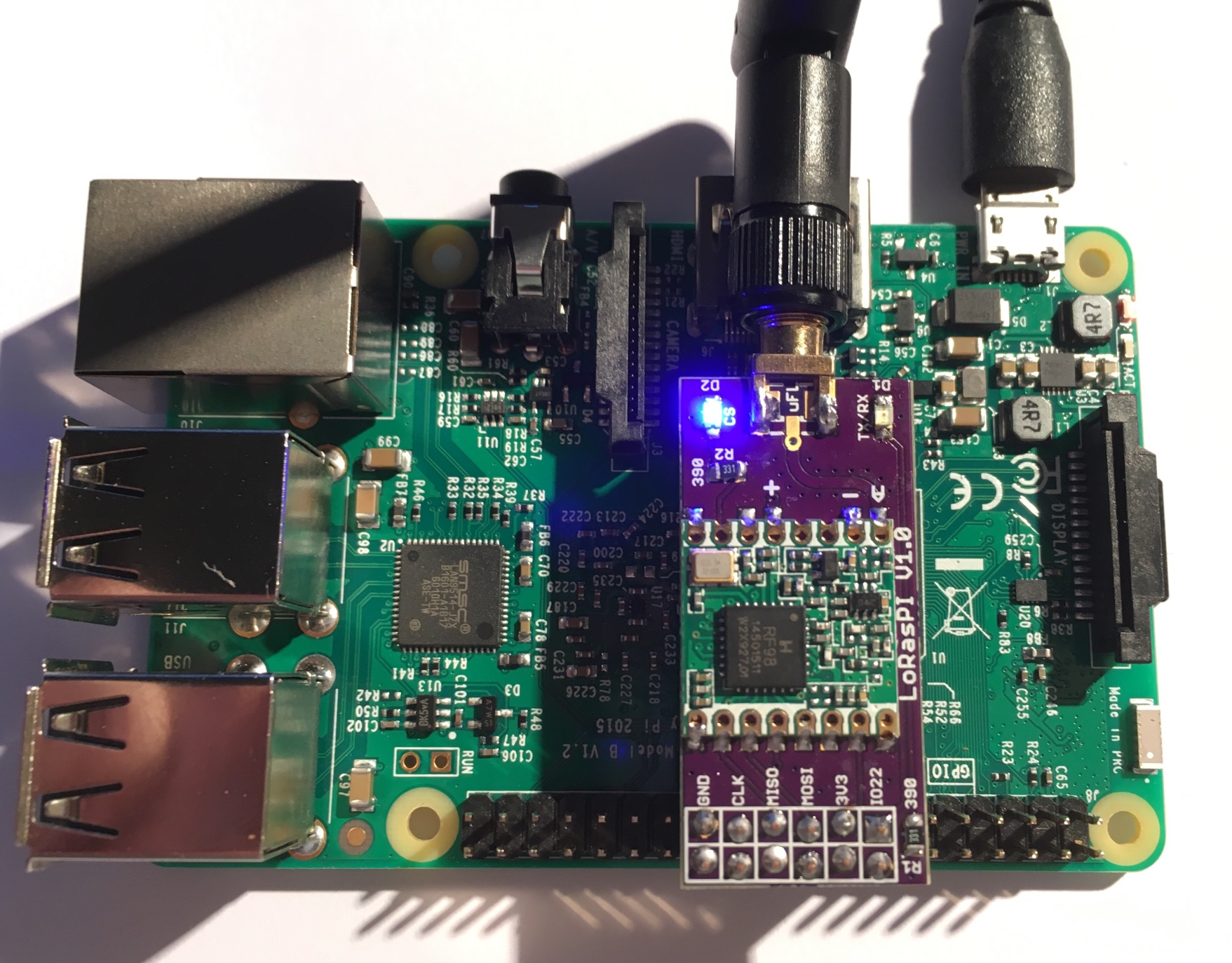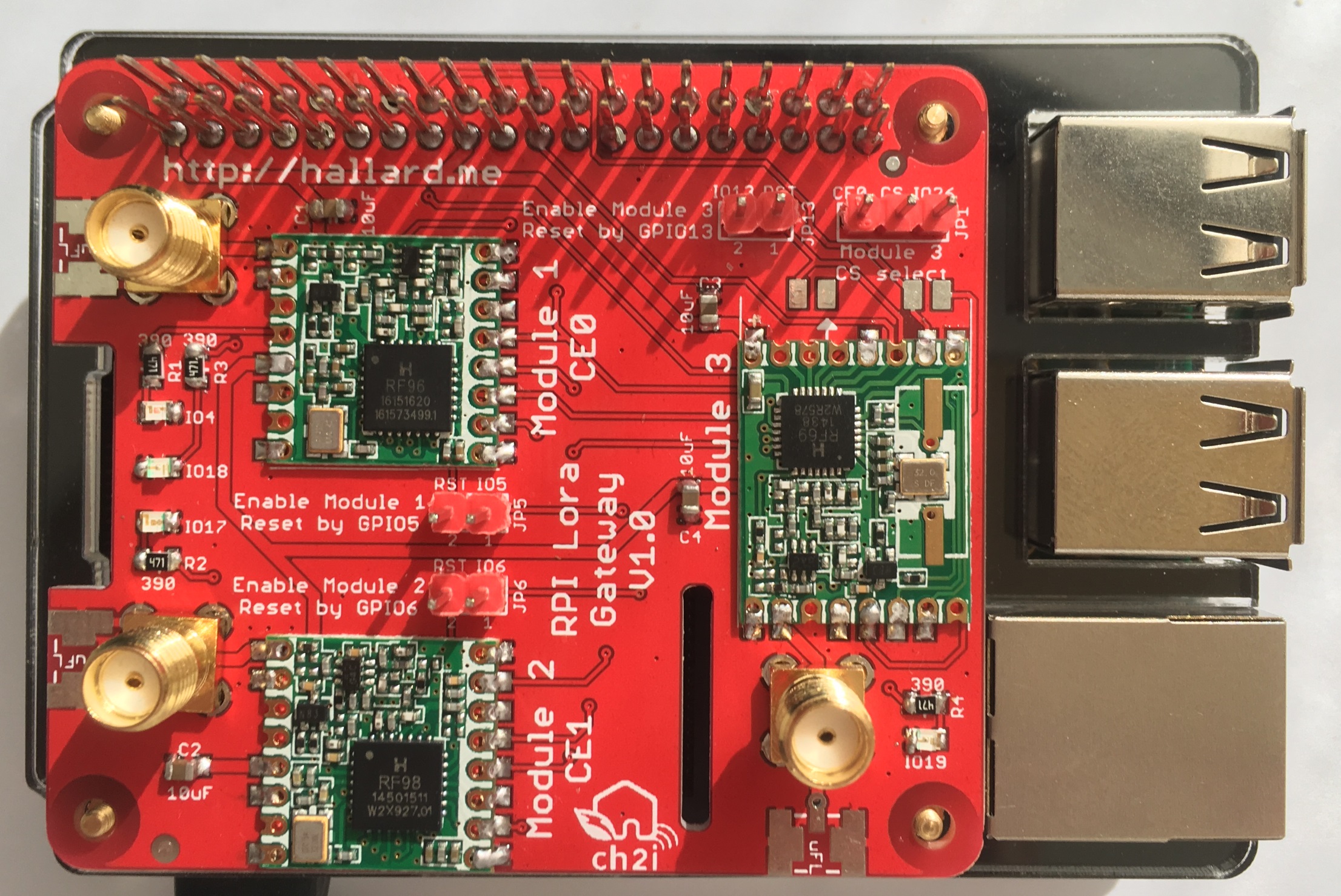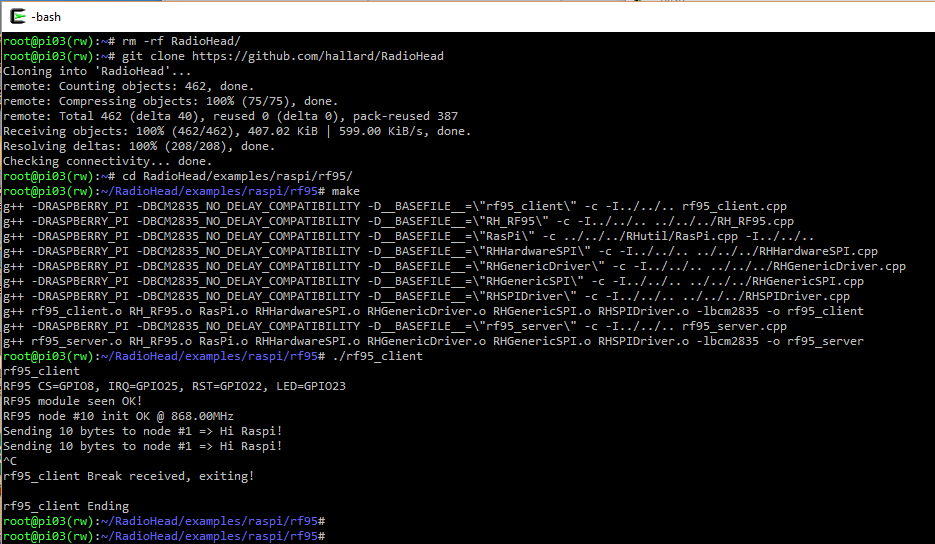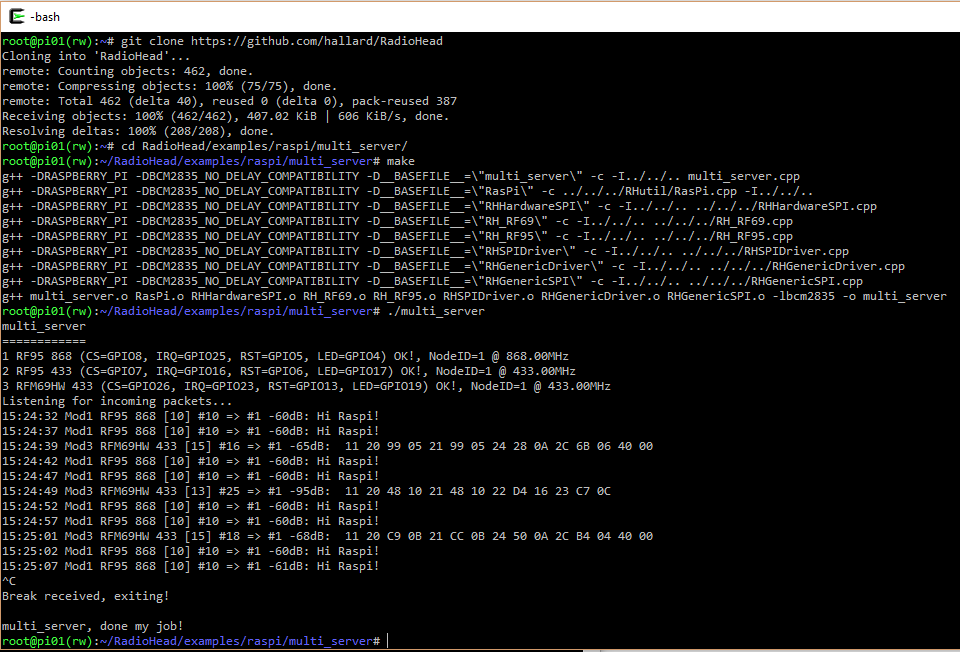###Version 1.67
This is a fork of the original RadioHead Packet Radio library for embedded microprocessors. It provides a complete object-oriented library for sending and receiving packetized messages via a variety of common data radios and other transports on a range of embedded microprocessors.
Please read the full documentation and licensing from the original author site
=================================
Compatible with boards
LoRasPI, Raspberry PI Lora Gateway, Dragino Lora GPS HAT
- Added moteino modem setting on RF69 to be compatible with lowpowerlab RF69 configuration library
- Added possibility to work with no IRQ connected for RF69 and RF95
- for example to get one more GPIO free
- on Raspberry Pi, we do not have
attachInterrupt()like with bcm2835 library
- Added samples for multiples Raspberry Pi boards with RF69 and RF95 modules such as
- LoRasPI, simple RFM9x or RFM69HCW shield
- iC880A or Linklabs Raspberry PI shield with RFM9x or RFM69HCW onboard
- Raspberry PI Lora Gateway with multiple RFM9x or RFM69HCW shield
- Dragino Lora shield
- Sample code are in rf95, rf69, nrf24 and multi_server, note that old sample NRF24 sample has been moved to nrf24 folder for consistency.
- Added 2 samples test tools (for Raspberry PI) do detect RF69 and RF95 modules and check IRQ rising edge
Sample code for Raspberry PI is located under RadioHead/examples/raspi folder.
================================
Clone repository
git clone https://github.com/hallard/RadioHeadConnection and pins definition
Boards pins (Chip Select, IRQ line, Reset and LED) definition are set in the new RadioHead/examples/raspi/RasPiBoards.h file. In your code, you need to define board used and then, include the file definition like this
// LoRasPi board
#define BOARD_LORASPI
// Now we include RasPi_Boards.h so this will expose defined
// constants with CS/IRQ/RESET/on board LED pins definition
#include "../RasPiBoards.h"
// Your code start here
#ifdef RF_RST_PIN
// Blah blah do reset line
#endif
Then in your code you'll have exposed RF_CS_PIN, RF_IRQ_PIN, RF_RST_PIN and RF_LED_PIN and you'll be able to do some #ifdef RF_LED_LIN for example. See rf95_client sample code.
So you have 3 options to define the pins you want
- The board you have is already defined so just need to define it your source code (as explained above)
- You can add your board into RasPiBoards.h and then define it your source code as above
- You can manually define pins in your code and remove the board definition and
#include "../RasPiBoards.h"
To go further with examples :
go to example folder here spi_scan
cd RadioHead/examples/raspi/spi_scanBuild executable
root@pi03(rw):~/RadioHead/examples/raspi/spi_scan# make
g++ -DRASPBERRY_PI -DBCM2835_NO_DELAY_COMPATIBILITY -c -I../../.. spi_scan.c
g++ spi_scan.o -lbcm2835 -o spi_scan
root@pi03(rw):~/RadioHead/examples/raspi/spi_scanAnd run
root@pi03(rw):~/RadioHead/examples/raspi/spi_scan# ./spi_scan
Checking register(0x42) with CS=GPIO06 => Nothing!
Checking register(0x10) with CS=GPIO06 => Nothing!
Checking register(0x42) with CS=GPIO08 => SX1276 RF95/96 (V=0x12)
Checking register(0x10) with CS=GPIO08 => Nothing!
Checking register(0x42) with CS=GPIO07 => Nothing!
Checking register(0x10) with CS=GPIO07 => Nothing!
Checking register(0x42) with CS=GPIO26 => Nothing!
Checking register(0x10) with CS=GPIO26 => Nothing!And voila! with LoRasPi board RFM95 dedected on SPI with GPIO8 (CE0)
If I'm doing same test with PI Lora Gateway with 2 RFM95 (one 433MHz and one 868MHz) and one RFMHW69 433MHz on board like this
Here are the results when trying to detect the onboard modules:
root@pi01(rw):~/RadioHead/examples/raspi/spi_scan# ./spi_scan
Checking register(0x42) with CS=GPIO06 => Nothing!
Checking register(0x10) with CS=GPIO06 => Nothing!
Checking register(0x42) with CS=GPIO08 => SX1276 RF95/96 (V=0x12)
Checking register(0x10) with CS=GPIO08 => Nothing!
Checking register(0x42) with CS=GPIO07 => SX1276 RF95/96 (V=0x12)
Checking register(0x10) with CS=GPIO07 => Nothing!
Checking register(0x42) with CS=GPIO26 => Unknown (V=0x01)
Checking register(0x10) with CS=GPIO26 => SX1231 RFM69 (V=0x24)Voila! 3 modules are seen, now let's try listenning packets with PI Lora Gateway.
My setup has another Raspberry Pi with RFM95 868MHZ LoRasPI shield running rf95_client sample and some ULPnode prototypes always running with on board RFM69 configured as Group ID 69 on 433MHz. I don't have a Lora 433MHz sender running so we won't receive anything on this one.
Here the results starting from scratch
Client side
multi server side
It works!
========================================
Due to easier maintenance to keep in sync with original author lib, I've got 2 repo:
- My master one (this one) https://github.com/hallard/RadioHead that is the one you need if you want to use my projects or lib added features.
- The one above has been forked to https://github.com/ch2i/RadioHead where I put the original version released by the author.
Like this, I can do Pull Request from ch2i to hallard to add new features added by the author to my version. This mean that this one is just a github copy version of the latest original done by Mike, I don't do any change on this one. I know it's not the best way, but I didn't found a better solution for now, if you have better idea, just let me know.





